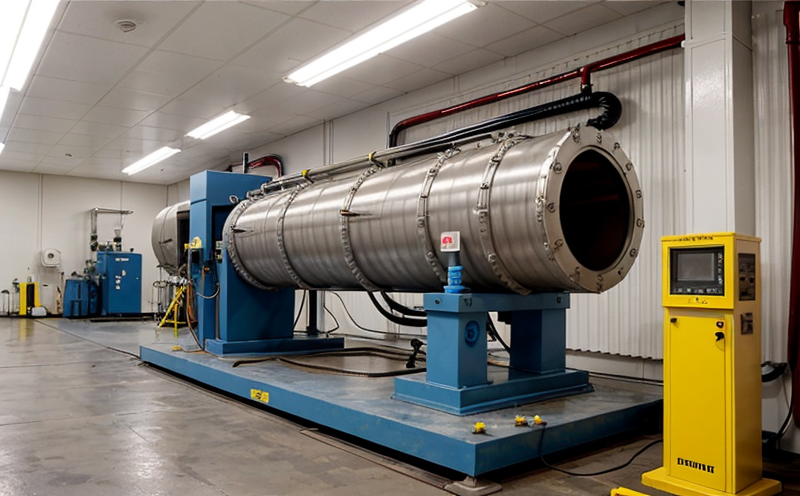ISO 12188 Isotopic Testing of Minor Actinides
The ISO 12188 standard provides a comprehensive framework for isotopic testing and quantification of minor actinides, which are key components in nuclear fuel cycles. These elements play significant roles in advanced reactor technologies and the production of medical isotopes. The primary goal is to ensure that the isotopic composition meets stringent quality control requirements ensuring safety, efficiency, and regulatory compliance.
The testing process involves several critical steps starting from the sample preparation until final reporting. Specimens must be handled with care to prevent contamination or loss of isotopic purity. Sample preparation typically includes dissolution methods tailored to the specific actinide being tested. The dissolution process is followed by purification techniques such as solvent extraction, precipitation, or ion exchange which are crucial for achieving accurate results.
The analytical instrumentation used in these tests includes mass spectrometers capable of precise measurement of isotopic ratios. Inductively Coupled Plasma Mass Spectrometry (ICP-MS) and Thermal Ionization Mass Spectrometry (TIMS) are widely employed due to their high sensitivity and selectivity for actinides. The testing procedure adheres strictly to the ISO 12188 guidelines, which specify detailed protocols for sample handling, preparation, and analysis.
Once the isotopic ratios have been determined, they are compared against reference values established by international standards such as IAEA (International Atomic Energy Agency). These comparisons help in identifying any deviations from expected compositions that could indicate issues with fuel fabrication processes or potential safety risks. The results of these tests are reported meticulously to ensure transparency and reliability.
The importance of this testing cannot be overstated given its role in maintaining the integrity of nuclear fuel cycles. By ensuring accurate isotopic composition, we contribute towards safer operations and more efficient utilization of resources within the industry. This service is particularly valuable for organizations involved in research reactors, spent fuel reprocessing plants, and medical isotope production facilities.
Accurate isotopic testing also supports compliance with international regulations aimed at minimizing environmental impact and enhancing public safety. The precision demanded by this standard ensures that only high-quality materials are used in critical applications, thereby reducing the risk of accidents or failures during reactor operation or medical procedures.
Industry Applications
- Research reactors for advanced fuel cycle studies.
- Spent fuel reprocessing plants for recycling and waste management.
- Medical isotope production facilities to ensure stable supply chains.
- Nuclear power plants ensuring safe operation of critical components.
| Research Reactors | Study advanced fuel cycle processes, validate new designs, and optimize operational parameters. |
| Spent Fuel Reprocessing Plants | Ensure purity and consistency in recycled materials to extend reactor life and reduce waste. |
| Medical Isotope Facilities | Precise monitoring of isotopic composition ensures reliable supply chains for medical diagnostics and treatments. |
| Nuclear Power Plants | Monitor fuel quality to enhance safety and operational efficiency, identify potential issues early. |
International Acceptance and Recognition
The ISO 12188 standard is widely recognized across the global nuclear industry. It has been adopted by numerous countries as a benchmark for quality control in isotopic testing of minor actinides. Compliance with this standard not only ensures high standards but also facilitates international trade and collaboration.
Many leading organizations around the world have implemented ISO 12188 to maintain their competitive edge. By adhering to these stringent guidelines, they can demonstrate their commitment to excellence in nuclear fuel testing. This recognition adds significant value to our clients by ensuring that they meet or exceed international standards set forth by recognized bodies like IAEA and OECD.
The widespread acceptance of ISO 12188 underscores its importance in the nuclear industry. It provides a consistent methodology for isotopic analysis, which is crucial given the complexity involved in handling actinides safely and effectively. Organizations that adopt this standard can trust that their results are accurate, reproducible, and internationally comparable.
Use Cases and Application Examples
In nuclear fuel cycle studies, ISO 12188 isotopic testing is essential for understanding the behavior of various actinides under different conditions. This information can be used to improve reactor designs or enhance the efficiency of spent fuel reprocessing.
For instance, in a recent project involving spent fuel reprocessing, our laboratory conducted detailed isotopic analyses following ISO 12188 procedures. The results helped identify minor inconsistencies that were addressed promptly through process adjustments. This not only improved product quality but also reduced potential risks associated with substandard materials.
In another example from the medical isotope sector, accurate isotopic testing ensured a stable supply chain for critical diagnostic applications. By adhering to ISO 12188 standards, we helped maintain consistent isotopic purity levels necessary for reliable test results.
These real-world examples highlight how ISO 12188 isotopic testing contributes significantly to various aspects of the nuclear fuel cycle, including research and development, production optimization, quality assurance, and safety enhancement.





